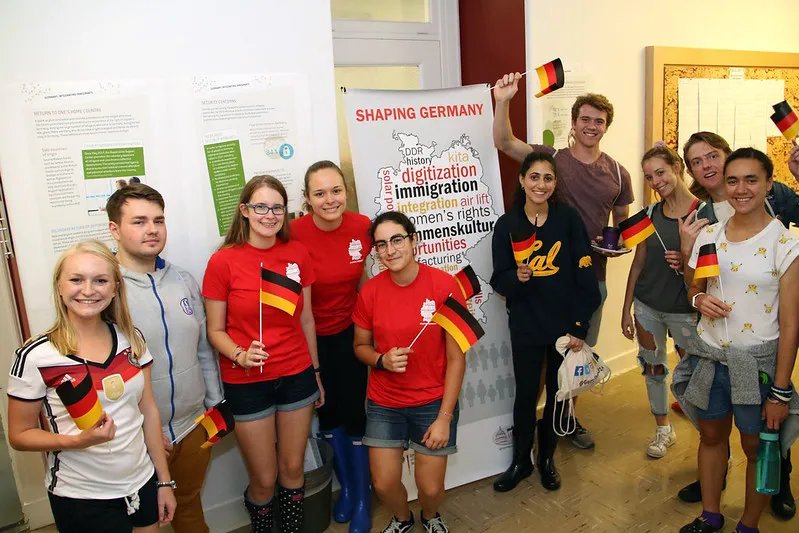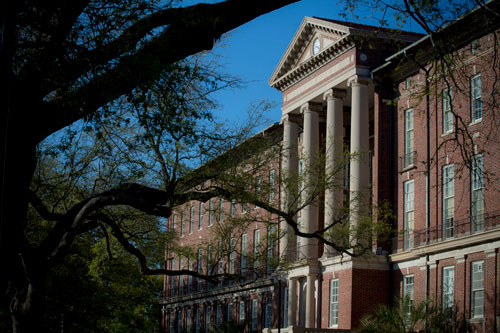
For the second year in a row, the Tulane Depatment of German and Slavic Studies is collaborating with the Embassy of the Federal Republic of Germany on a series of programs to build greater awareness of German history and culture. This year, the collaboration falls on the 30th anniversary of the destruction of the Berlin Wall.
Dr. André Schütze, a professor in German in the School of Liberal Arts, grew up in East Germany, never experiencing life without the wall until its demise. Recently, Dr. Schütze shared details with English and linguistics senior Elizabeth Vidrine about his life before and after the wall’s destruction, and the impact that its anniversary will have on this year’s collaboration.
Elizabeth Vidrine: Tell me about the collaboration with the German Embassy. What can we expect from this year’s programs at Tulane?
Dr. André Schütze: Every year the German Embassy in Washington, D.C. works together with select universities all over the U.S. to promote collaborations with Germany. This year’s project will commemorate the fall of the Berlin Wall 30 years ago. To celebrate this anniversary we have prepared a variety of events for students and the broader academic community, and began the festivities with guest lecturer Joes Segal, a curator from the Wendemuseum in Los Angeles, on October 15. On October 18 we will open a poster exhibition, “Totally East,” about everyday life in East Germany. The exhibition will take place on the third floor of Newcomb Hall until the end of November. This year’s program also includes a film series organized by students from the Tulane German Club. We will show some classic movies that deal with the experience of the Deutsche Demokratische Republik or German Democratic Republic (DDR), including humorous films like Sonnenallee and dramatic offerings like Barbara. All of these events will give us a chance to have a comprehensive look at life behind the wall and what finally led to its astonishing fall.
The Cold War created a political situation that reduced the East and the West into two blocks of enemies and just one night in history changed all of that.
Elizabeth: What can you tell us about life before the wall fell?
André: For someone who grew up in East Germany and never experienced life without the wall, there was a surprising normalcy to this kind of life. In spite of the restrictions on travel, the West still had a marked influence on our society through television and radio. Almost everyone watched shows, films, and news from the West, so East Germans knew much more about life in the West than Westerners knew about the East. But that is not to say that Easterners really imagined a life in a united Germany. The Berlin Wall was not hidden; you could see it every day. You saw the buildings on the other side, saw tourists coming from the West, and we still lived a normal though immured life. Just like people in West Berlin accepted the existence of the wall, people in the East did the same. It seemed almost impossible to imagine a different way of living. That is why the events in 1989 were so surprising to everyone. Changes in politics in East Germany gave rise to a fervent push for democracy and personal freedom. The public’s overwhelming call for free travel abroad finally led to the fall of the wall.
Elizabeth: How did things change after the wall’s removal?
André: A lot of the changes already happened before the events on November 9, 1989. Just a couple of days earlier, a huge demonstration on Alexanderplatz, East Berlin’s large public square, drew hundreds of thousands of people demanding political change. Never before had East Germany seen such a manifestation of the will of the people, from workers to intellectuals. With the sudden opening of the Berlin Wall there was a shift from the evolving politics in the DDR to working together with West Germany, and finally to the idea of a reunification. For a short time there was an unbelievable feeling of freedom and of possibilities during this transitional stage, when East German laws seemed obsolete and West German laws were not yet in effect. People were able to move freely, follow their dreams, open new cafes, publish new magazines. It was a brief moment of utopia.
Elizabeth: For you, what is the significance of the wall’s destruction?
André: I had just finished high school when the wall fell and was beginning a career as a printer. I was actually printing the news the night that they opened the wall. The Wende—a term used to describe the many changes that led to the wall’s destruction—came at a pivotal point in my life and allowed me to define my own path and pursue things that were of value to me. I was able to obtain my Abitur (a certificate similar to a high school diploma that allows you to study at a university), study abroad in Rome, and eventually move to Los Angeles. As a scholar, my research on East Germany allows me to look back on this time period through a more nuanced lens; the East German films that provide subtle yet trenchant critique of their society and the literature that exposes our irrepressible humanity make me appreciate the DDR in a different way. Very often we are convinced of the stability and permanency of our society, but the events in 1989 showed us how fast change can happen. The Cold War created a political situation that reduced the East and the West into two blocks of enemies and just one night in history changed all of that.
To learn more about the fall of the Berlin Wall and for more information on the “Wunderbar Together” collaboration between Tulane’s Department of German and Slavic Studies and the Embassy of the Federal Republic of Germany, visit our news page.
Elizabeth Vidrine (SLA '20) is a senior majoring in English and linguistics with a passion for education. She loves theatre and the arts, literature, and spending time with her family in Ville Platte, Louisiana. After graduation, she hopes to pursue a career in creative writing and American Sign Language interpreting.
